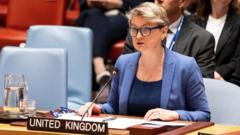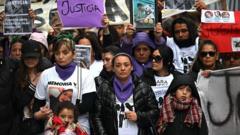Are UK, France, and Germany's Warnings Enough to Stop Iran's Nuclear Ambitions?

Published: 2025-09-28 01:30:17 | Category: world
The UK, France, and Germany have urged Iran to avoid escalating tensions and to engage in negotiations following the reinstatement of UN sanctions. The countries, collectively referred to as the E3, stated that these measures were a last resort due to Iran's ongoing nuclear advancements and lack of cooperation. They stressed that the reimposition of sanctions should not end diplomatic efforts.
Last updated: 21 October 2023 (BST)
- The E3 countries have reinstated UN sanctions on Iran due to its nuclear escalation.
- Iran has denied intentions to develop nuclear weapons, labelling the sanctions as unfair.
- The sanctions were reimposed after Iran failed to comply with previous agreements.
- The IAEA has resumed inspections, but Iran has limited access to its nuclear sites.
- Iran is recalling its ambassadors to the E3 nations for consultations.
The Context of the Sanctions
The reinstatement of United Nations sanctions against Iran marks a significant moment in international relations, particularly in the context of nuclear non-proliferation. These sanctions were first lifted in 2016 as part of the Joint Comprehensive Plan of Action (JCPOA), a landmark agreement aimed at curtailing Iran's nuclear programme in exchange for relief from economic sanctions. However, following the United States' withdrawal from the JCPOA in 2018 under President Donald Trump, Iran began to incrementally breach the terms of the agreement, leading to the current situation.
The E3's Justification for Sanctions
The joint statement from the E3—comprising the UK, France, and Germany—indicates that the reinstatement of sanctions was not taken lightly. They cited Iran's failure to adhere to its commitments and the lack of cooperation with the International Atomic Energy Agency (IAEA) as key reasons for triggering the "snapback" of sanctions. This procedure allows for the rapid reimposition of measures that had been previously lifted if a country is found in breach of its obligations.
Iran's Nuclear Programme: A Timeline
Understanding the timeline of Iran's nuclear programme is crucial to grasping the current diplomatic landscape. Key events include:
- 2006: The IAEA reports that Iran is enriching uranium, leading to initial sanctions.
- 2015: The JCPOA is signed, leading to the lifting of many sanctions.
- 2018: The US withdraws from the JCPOA, prompting Iran to begin violating the agreement.
- 2020-2023: Iran escalates its nuclear activities, leading to increased tensions with the E3 and other nations.
The Role of the IAEA
The IAEA plays a critical role in monitoring Iran's nuclear activities. Under the terms of the JCPOA, Iran was required to allow regular inspections of its nuclear sites. However, Iran has limited the IAEA's access in recent months, which has raised concerns about transparency and compliance with international agreements. The reinstatement of sanctions has further complicated the relationship between Iran and the IAEA, with Tehran claiming that sanctions jeopardise ongoing negotiations.
Recent Developments and Statements
Iran's President Masoud Pezeshkian has publicly condemned the sanctions, labelling them as "unfair, unjust, and illegal." He has reiterated Iran's stance that it does not seek to develop nuclear weapons, despite the international community's concerns. This assertion comes amidst reports of Iran enhancing its nuclear capabilities, which has alarmed both the E3 and other nations.
Diplomatic Efforts Continue Amid Tensions
Despite the reimposition of sanctions, the E3 have expressed a willingness to continue pursuing diplomatic avenues. They have highlighted their commitment to dialogue, stating that the return of sanctions does not signify the end of diplomacy. This approach indicates a desire to find a resolution that addresses the concerns of all parties involved while maintaining regional stability.
Iran's Response to Sanctions
In reaction to the sanctions, Iran has initiated the process of recalling its ambassadors to the E3 countries. This move signals Tehran's discontent with the current geopolitical climate and is likely aimed at reassessing its diplomatic strategy. Pezeshkian has stated that Iran requires assurances regarding the safety of its nuclear facilities before it can normalise its enrichment activities.
Possible Future Scenarios
The future of Iran's nuclear programme and its international relations remains uncertain. Several potential scenarios could unfold:
- Increased Tensions: If Iran continues to escalate its nuclear activities, further sanctions or military actions could occur.
- Diplomatic Breakthrough: A renewed commitment to negotiations could lead to a new agreement that addresses both sanctions and Iran's nuclear ambitions.
- Regional Instability: Heightened tensions could trigger regional conflicts, particularly if Iran feels threatened by military actions from Israel or the US.
Conclusion: A Call for Caution
The current situation underscores the complexities of international diplomacy surrounding Iran's nuclear programme. As the E3 call for restraint and dialogue, it is essential that all parties approach the matter with caution and a commitment to finding a peaceful resolution. The stakes are high, not only for Iran but for global security and stability.
What will be the next step for Iran and the E3? Can diplomatic efforts avert a potential crisis? Only time will tell. #IranNuclearTalks #E3Diplomacy #InternationalRelations
FAQs
What are the UN sanctions on Iran?
The UN sanctions on Iran are economic and military measures reinstated to pressure the country to comply with international nuclear agreements. They were originally lifted as part of the JCPOA in 2016.
Why did the US withdraw from the JCPOA?
The US withdrew from the JCPOA in May 2018, citing concerns that the agreement was flawed and did not adequately prevent Iran from developing nuclear weapons.
What is the IAEA's role in Iran's nuclear programme?
The IAEA is responsible for monitoring compliance with nuclear agreements, including conducting inspections of Iran's nuclear sites to ensure transparency and adherence to international standards.
What is the snapback procedure?
The snapback procedure allows for the rapid reimposition of UN sanctions if a country is found to be in breach of its commitments under international agreements, such as the JCPOA.
What might happen next in Iran's negotiations with the E3?
The future of negotiations between Iran and the E3 is uncertain. Diplomatic efforts could either lead to a new agreement or result in increased tensions if Iran continues to escalate its nuclear activities.



